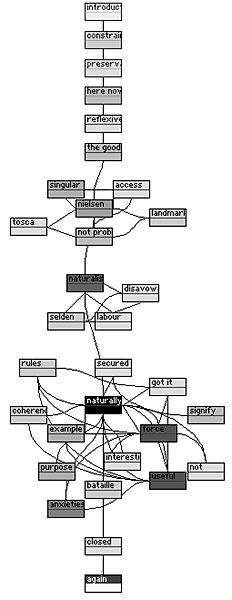
|
Links are moments of risk in writing and reading.
When writing in a manner that we might characterise as 'hypertextual', that is, a writing in which the materiality of hypertext is not confused with the convenience of electronic dissemination, the link always remains open as a point of possibility. You can link from any point within a node to, in principle, any other point; you don't need to finish writing the content, nor do you need to assume that the reader will have read all the content within the node. Indeed, in a system such as Storyspace, you can start a link for a node which does not yet exist!
This excess or openness is radicalised by the link as that moment in writing when the writer decides (is called) to link. This point or moment contains within it a series of possible futures that falls outside of our ordinary conceptions of writing. When I write, grammar and the formal rules of language composition in English (in my particular case) constrain the set of possibilities for what can follow. These constraints are what allow us to learn how to write, and this is what allows writing to be the iterative, recontextualising practice that it is (see for instance Derrida's "Limited Inc"). In other words, writing a sentence (and perhaps how we've learnt to make an argument) can be thought of as a series of decreasing options as the sentence, or argument, proceeds -- choice appears to be largely inverse to length (a point Douglas also makes in connection to linear fiction in "Books Without End").
However, when I'm linking, there are no such restrictions or possibilities. The link does not require, need, or even recognise a codified set of rules for what may or may not be linked, either in terms of origins or destinations. To this extent the link always presents itself as a virtual outside to the codified norms of language, that is to grammar, syntactic organisation, and rhetoric.
For the reader, the link is also a moment of risk. This risk is that of comprehension and of readerly control. To follow a link is to surrender, in that moment of choice, control to a system whose logic of operation and connection remain unknown. A link is, then, in such a system, little more than a roll of the dice, and just as the dice may have a small set of outcomes (let's say one in six), the particular outcome remains unknown in each instantiation. A link always operates like this, and for the reader this excess is a bet made with, and for, each link followed. That its force has been colonised by an existing model of writing is not surprising, as these qualities of the link move it outside of the system and processes of writing as we have ordinarily conceived them to be and so remain largely invisible to such systems.
Furthermore, the logic of the link, to the extent that such performative events can be thought of to contain or express a logic, is analogical rather than binary. Their operation is one of similitude, that is analogy and metaphor, of differences in degree that are able to tolerate the similar within a system of writing that is not node-link-node (this-then-that) but is more accurately node-and-node (this-and-this).
|